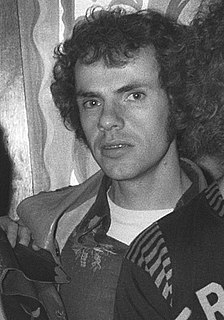A Quote by Hannah Arendt
Violence is an expression of impotence.
Quote Topics
Related Quotes
Victory attained by violence is tantamount to a defeat, for it is momentary.It is better to be violent, if there is violence in our hearts, than to put on the cloak of nonviolence to cover impotence. Violence is any day preferable to impotence. There is hope for a violent man to become non-violent. There is no such hope for the impotent.
I call it financial impotence, this notion of not having enough money, because it has the same characteristics as sexual impotence. And men will never talk about sexual impotence, no matter how close you are to someone, but financial impotence is an even greater barrier. And, I broke that omerta. I had people walk up to me in the grocery store - Several people, coming up to me and saying, "Gosh. Let me tell you my story." People are so pent up with their sense of financial impotence, that they're dying to get it out!
In the secret of my heart I am in perpetual quarrel with God that He should allow such things [as the war] to go on. My non-violence seems almost impotent. But the answer comes at the end of the daily quarrel that neither God nor non-violence is impotent. Impotence is in men. I must try on without losing faith even though I may break in the attempt.
I must remind you that starving a child is violence. Suppressing a culture is violence. Neglecting school children is violence. Punishing a mother and her family is violence. Discrimination against a working man is violence. Ghetto housing is violence. Ignoring medical need is violence. Contempt for poverty is violence.
We must realize that violence is not confined to physical violence. Fear is violence, caste discrimination is violence, exploitation of others, however subtle, is violence, segregation is violence, thinking ill of others and condemning others are violence. In order to reduce individual acts of physical violence, we must work to eliminate violence at all levels, mental, verbal, personal, and social, including violence to animals, plants, and all other forms of life.
I'm so sick of seeing guns in movies, and all this violence; and if there was going to be violence in Pines, I wanted it to actually be narrative violence. I wasn't interested in fetishizing violence in any way of making it feel cool or slow-motion violence. I wanted it to be just violence that affected the story.
I worked on movies with a lot of violence when I was a cinematographer, and it always bothered me. It's a personal thing. I wouldn't want my kids to see it. I certainly believe that freedom of expression shouldn't be taken away, but I also believe you can make movies that are thrilling and exciting without too much violence.
My approach to violence is that if it's pertinent, if that's the kind of movie you're making, then it has a purposeI think there's a natural system in your own head about how much violence the scene warrants. It's not an intellectual process, it's an instinctive process. I like to think it's not violence for the sake of violence and in this particular film, it's actually violence for the annihilation of violence.



































